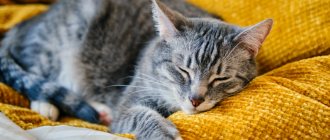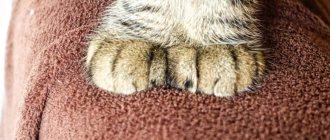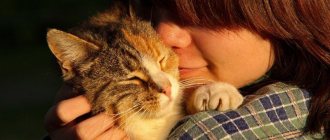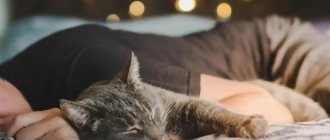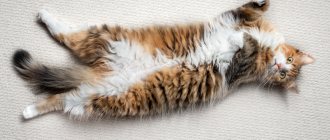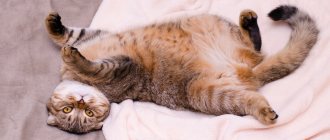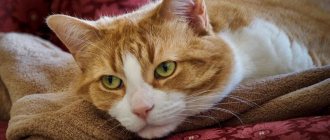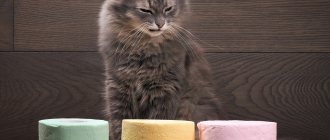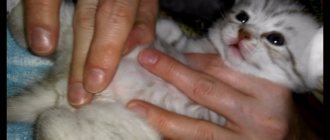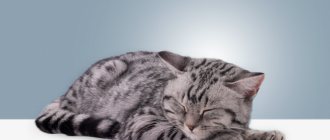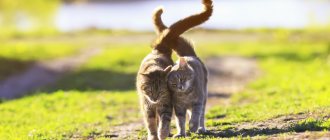The main reasons for frequent washing of a cat
Felinologists note that cats spend almost a third of their lives washing themselves. The main reasons for this.
Hygiene procedure
The cleanliness of pets is at a very high level. Cats wash themselves after sleeping, visiting the litter box, walking down the street, even after interacting with humans.
Washing is often accompanied by biting off irritants invisible to humans. But this is not necessarily a louse or a flea; this is how pets cleanse skin impurities.
Combing
Cats have a hard and rough tongue. Therefore, after a thorough wash, pets look well-groomed and combed. At the same time, they lick the fallen hairs from the fur, which settle in their stomachs. This can lead to the formation of hairballs and complications of the gastrointestinal tract.
In nature, wild cats know the need to regularly cleanse their food tract and eat special grass in order to expel the contents of their stomach. At the same time, they unmistakably know when the right moment has already arrived.
It is sometimes enough for pets to be given a special paste, a treat, or fed with grass, which is sold for this purpose in pet stores.
Also read: Why cats are afraid of water and what to do about it.
Preparing for the hunt
After the owner strokes the cat, it smells a foreign odor. And, as a born hunter, the pet is always ready to stalk prey. Moreover, the animal can do this for several hours, licking itself regularly. This is already a kind of masking of one’s own fluids.
It has been noticed that cats lick themselves more thoroughly and longer than males. This is also explained by the hunting instinct. After all, it is the females in any pride who are the best breadwinners.
Optimal body temperature
Cats constantly lick themselves regardless of the weather, but they do this especially actively when it is extremely hot or cold. At the same time, pets adjust their thermoregulation in a certain way.
At high ambient temperatures, the wool is moisturized and fluffed, the air between the hairs helps cool and protect the skin.
In winter, animals lick themselves so that the fur lies tightly, hair to hair, providing maximum protection from hypothermia.
Moisture protection
By moistening the fur with their tongue, cats not only trigger the thermoregulation mechanism, but also form a kind of water-repellent layer on the fur.
At the base of the hair there are glands that produce a special oil secretion - sebum. By evenly distributing it over the skin, animals give their fur protective properties.
In some breeds this ability is more developed due to genetics. These are, for example, the Turkish Van or the Norwegian Forest - natural hunters and fishermen. They can bathe without fear of their fur getting wet.
Communication
Despite the fact that cats are loners by nature, they communicate remarkably well with their fellow animals and with other animals through licking. They not only help each other wash hard-to-reach places (head, back, neck), but also exchange scents and show signs of attention and affection.
Rutting cats happily lick their friends, leaving a kind of mark on them. Nursing females wash their offspring all day long, not only performing hygiene and massage procedures, but also expressing love for the kittens.
Stress
By licking themselves, cats perform self-massage of the body - after all, their tongue is an extremely developed muscular organ that can exert high pressure on the skin and areas of the body.
This promotes relaxation, decreased muscle tone, and relief from fear and the effects of stress.
A frightened or irritated animal, as soon as the imaginary or actual danger recedes, immediately begins to lick itself, as if removing all the negativity from itself.
Hunting instinct
Cats are believed to be very clean. But this is only one of the reasons for frequent licking. During walks, animals can tinker in the sand or soil for a long time, and they are not bothered by dirty fur. However, cats wash themselves frequently at home. Why is this happening?
One of the main reasons for licking is the desire to get rid of foreign odors. Sometimes you can notice how cats begin to wash themselves after stroking or playing with the owner. This habit was left to them from the ancestors of domestic cats. Wild representatives of the cat family eliminated odors in this way in order to be invisible during the hunt. In addition, pets have a very sensitive sense of smell. They do not like other people's smells and recognize only their own.
If the cat stops licking itself
In this case, very quickly her appearance becomes unkempt and unkempt. Giving up a natural habit always indicates serious problems and should cause concern to the owner.
Oral diseases
Often the reason for refusing to wash your face is diseases of the gums and oral cavity. For example, gingitis, the initial stage of periodontal disease.
An inflamed, red area appears around one or more teeth, and over time it becomes covered with ulcers and sores. Any movement of the tongue causes severe pain to the animal and, along with other signs such as putrid odor from the mouth, refusal to wash also indicates this unpleasant disease.
Arthritis of the joints
If a cat develops arthritis of the joints, any movement causes him pain. He washes himself less often and less effectively. If the front paw is affected, it is difficult for the pet to wash its face. But if the back hurts, then usually nothing prevents you from reaching the sore spot, and the animal will lick it especially long and carefully, trying to reduce the discomfort.
Excess weight
Obesity is another problem in modern pets, especially after spaying and neutering. If pets are not switched to proper nutrition after surgery, excess weight will inevitably appear in a few months.
In addition to changes in appearance and gait, insufficient washing is another symptom of this pathology. It is caused by difficulty in mobility and the clumsiness of overweight animals.
Stressful conditions
Sometimes a cat stops licking itself due to severe stress. This is, for example, how a young animal behaves when it changes its owner and place of residence. It has been noticed that a pet sometimes does not drink, eat, go to the toilet or wash itself for several days.
Usually, the patience and affection of a person helps the kitten cope with its depressed state and return to normal life.
Sometimes, out of fear and stress, a cat, on the contrary, begins to wash itself incessantly. This is also a reason to seek veterinary help. Your pet will most likely be prescribed sedatives.
Systemic and infectious diseases
If the cat has stopped licking itself, its fur looks greasy, dirty, this is accompanied by apathy and lethargy, loss of interest in food and games, you should immediately consult a veterinarian.
All severe infectious diseases and chronic pathologies fit this set of primary symptoms, and it is important to quickly establish a diagnosis and begin treatment.
Veterinarians note that in the presence of fleas, other external parasites, helminths, and allergic reactions, the pet, on the contrary, becomes overly active, even more irritable and constantly licks itself.
Thermoregulation method
Kittens and adult cats wash themselves to normalize their body temperature. Washing is aimed at forming a moisture-repellent layer on its surface, which is responsible for maintaining the process of thermoregulation. Frequent licking activates the glands that are located at the base of the hair follicles and produce sebum. This substance is an oil secretion that creates a special barrier that serves to protect the cat’s skin from external negative factors - excessive influence of moisture, dry air, low and high temperatures.
The goals that cats pursue in the process of washing themselves depend on the time of year and the temperature conditions in the room in which they live. They have an air gap between their skin and fur. With the help of their tongue, these animals can change its thickness, cooling themselves in the heat and warming themselves in the cold.
Folk signs about a cat washing itself
There are many signs associated with washing a cat:
- If a cat washes its back and tail, there will be rain and bad weather, cheeks and nose - to clear and sunny weather.
- When a cat rubs its face with both paws, you need to track which direction it turns its head, since it is from there that the strong wind will soon come.
- If a pet washes its left ear, a woman will soon come to visit, and the right ear, a man will come to the house. The cat’s paws at this moment are warm - relatives will come, cold - to unexpected visitors.
1111
Where did the belief come from?
Cats are very sensitive to climate change - this is where weather signs come from.
It is not yet known exactly how, but cats anticipate the appearance of people in the house. According to esotericists, they see how energy is changing. There is no exact explanation, but many know from experience how a pet sits at the front door shortly before the return of a beloved family member.
It is believed that the arrival of guests is known to cats in advance. Strangers are stressful for animals and they try to “calm their nerves” by thoroughly washing themselves.
Treatment
Noticing that a cat is itching and licking, how to treat it is a question that owners often ask their veterinarian. This phenomenon does not refer to an independent disease, but is just a symptom of the development of a pathology, and therefore cannot be treated separately.
Having established the true cause of the disease, you can relieve the animal from constant scratching and licking of its fur. So, when ringworm and other fungal infections are detected, antifungal drugs are prescribed. If ticks are the cause of concern, then acaricidal agents are chosen to treat the coat.
If the cause of scratching is an allergy, the pet will be prescribed antihistamines to reduce itching if the clinical picture is severe. In case of an allergic nature, it is necessary to change food, hair care products and other allergens.
For pyoderma, otitis media, dermatosis complicated by infection, the pet is usually prescribed antibiotics and corticosteroid anti-inflammatory drugs.
Complex therapy for skin diseases necessarily includes vitamins (especially B vitamins and vitamin A) and immunomodulators (Gamavit, Ribotan, etc.).
Cleaning newborn kittens
After giving birth, the first concern of the mother cat is to remove the amniotic sac and then lick the kitten with a rough, rough tongue to encourage it to breathe. Later, when the kitten begins to suckle, she massages it with her tongue to stimulate bowel movements.
Imitating their mothers, kittens begin to lick themselves by the time they are 4-5 weeks old. If there are several kittens in a litter, they may also lick each other.
In addition to simple cleanliness, grooming for cats has many purposes. Some of them are more important than others.
But there is no dog: what is the reason?
Scientists pondering this question have come to the conclusion that evolution is the explanation. The fact is that the cat’s ancestors, who inhabited the earth thousands of years ago, used cunning to hunt, waiting tactics to track prey, and a lightning-fast form of attack that discouraged the victim to attack.
Dogs descended from wolves, whose reprisal against potential prey is always open, and success in fights with prey was achieved through numerical, speed and strength superiority. In addition, dogs are pack creatures by nature.
The coexistence of individuals within a group is possible only if there is a certain individual smell on the fur, which serves as an identifier for dividing into “friends” and “strangers”.
Diagnostics
Having noticed that the furry pet is constantly itching, licking itself and the nature of these manipulations is not similar to normal grooming, the owner should first of all inspect the animal for the presence of fleas. In their absence, it is necessary to analyze the following points: whether the diet has changed (changing the usual food for another), whether any plant has bloomed in the apartment, whether a new shampoo has been used for washing.
If the owner notices that the cat is itching until it bleeds, what to do in such a situation? An animal with symptoms suggestive of skin disease (scratching, licking, head shaking) should be seen by a veterinarian. Due to the many pathologies associated with scratching, it is not possible to independently diagnose a pet.
In a specialized institution, scrapings will be taken from him and microscopic and, if necessary, bacteriological tests will be performed. Examination of samples under a microscope makes it possible to detect fungal spores (with trichophytosis and microsporia), mites (with sarcoptic mange, demodicosis, notoedrosis, etc.). If a hormonal nature is suspected, the veterinarian will prescribe a blood test and examine the pet’s endocrine system.
The ritual of licking is a means of self-soothing
The cat washes itself because it wants to calm down. These animals have a flexible psyche. They can be upset by things like traveling in a car, visiting a veterinary hospital, moving to another room, or having another pet in the house. The sensations they experience when a rough tongue touches their body are similar to what people experience during a relaxing massage.
While washing, the animal concentrates. It can devote a lot of time to this process. So that no one disturbs the pet and does not interrupt it from relaxation, it tries to choose a secluded place for self-massage. Do not disturb your pet while it is washing itself.
Cats are not always able to cope with stress on their own. In case of severe emotional shock, massage alone is not enough; the use of sedatives is required.
Other explanations
Cats are the basis for most road signs.
A fairly popular sign when a cat washes itself is that the animal “washes” the guests, i.e. if it intensively rubs its face with its paw, it means it’s time to prepare for their arrival. In the East, this sign is clarified: if, in addition, the cat additionally scratches its ear with its paw, a visit from “difficult” guests is planned.
It is possible to identify a number of monetary signs that connect the habit of a pet with various circumstances. In the case when a cat reaches out to its owner, benefits are expected in any planned enterprise. In this case, Japanese merchants even kept a pet in order to navigate their own ideas based on the cat's sign. If she runs her left paw over her ear, then the upcoming deal should be incredibly successful. Chinese shopkeepers revered the animal as a guardian of wealth, so a stranger’s pet entering the house and sitting on the doorstep to wash itself is a sign of loss of wealth and failure.
Considering signs, you can resort to various predictions. One more thing can be noted, albeit an unpleasant one, related to death. A certain circle of people believe that the first person to look in the mirror after what happened in the house will be the next. You can protect yourself from this only by holding a cat up to the mirror, which will allow you to protect yourself.
Excessively active licking is a symptom of stress in a cat or a mental disorder
A trip in a car, severe fright, the appearance of a child in the family, or a change of owner can develop into stress for a pet. Self-massage does not always help kittens and adult cats cope with severe emotional shock. One of the signs that a stressed animal needs help is fanatical licking until bald spots and wounds appear on the body.
- has lost interest in food or, conversely, often demands food;
- has become apathetic and does not respond to the owner’s call;
- does not come out of hiding for a long time;
- tries to chew inedible things;
- chasing his own tail without being a kitten;
- wanders aimlessly around the house.
Fanatical licking can also be a sign of mental disorder. Animals with mental disorders exhibit inappropriate behavior:
- unmotivated aggression;
- fear of familiar things, other animals and people;
- a sudden change in mood (for example, a pet can fawn on its owner - and the next second rush at him with a ferocious look);
- atypical reaction to touch;
- prolonged lack of sleep, etc.
If your pet has at least a few of these symptoms, it should be taken to a veterinarian. In cases not aggravated by complications, sedatives will help remove the animal from a state of stress and eliminate its mental disorders. In severe situations, serious long-term treatment may be needed.
Source
A cat washes itself and washes away the trouble: What does “washing” the cat save the owner from, a psychic said
- Advertising
- Feedback
- Vacancies
- Contacts
VladTime publication (news from Russia, Ukraine and the world). This website disseminates information provided by the news agencies Vladtime, Interfax, TASS and others, as well as independent authors and editors who are allowed to independently publish materials on the portal. Vladtime.ru is a service platform for authors of independent articles and media. The administration of the service site vladtime.ru is not responsible for materials published by the authors and editors of the media on its pages. The opinions and versions of the authors and editorial staff published on the service are completely independent and may not coincide with the views of the site administration. Materials that do not comply with the legislation of the Russian Federation are prohibited from publication on the pages of the site. Every author or union of authors in the form of an editorial board can obtain the opportunity to independently publish exclusive materials on the site, in accordance with the rules of the site. You can start publishing materials on the service by writing us a request via email with a brief description of the author’s experience. Postal address: [email protected] When using, copying, quoting publications of the information portal “Vladtime.ru”, a direct link to the page of the material used is required: indicating the name of the portal and the author with the following working hyperlinks: news, VladTime news, Vladtime.ru news, or another logical link. A user who notices possible violations of legislation or intellectual rights by the site’s authors can contact the administration via an email address marked “page moderation.” © 2009-2019 VladTime.ru - news
Interesting interpretations
Signs when a cat washes itself can be very different. Most people are familiar with the sign: if the cat begins to wash itself, there will soon be guests. However, this belief among most peoples is considered a certain basis, which gradually acquired more interesting and extensive explanations of this cat procedure. You can consider the most interesting of them:
- Licking, while washing, the entire skin or only the tail - misfortune is approaching, or bad weather in the form of rain, blizzards.
- He licks his paws and head with his paw - soon the weather will be good (although he scratches behind the ear - snow and rain cannot be avoided).
- Thoroughly washing the ears is a sign of rain (it dates back to Ancient Rome).
- From which side the cat washes itself with its paws, the wind will blow from it (this meaning comes from Serbia).
Frequently encountered options regarding the appearance of guests or signs when a cat washes itself:
- Washing at the door means waiting for the priest to arrive.
- Washing the right ear means that a stranger will come.
- Washing the left ear means the arrival of a stranger.
- If an animal runs its left paw over its ear, you should expect buyers (Japanese proverb).
- Warm hind paws when washing - expect welcome guests, cold - unwanted.
Prevention
Preventive measures boil down to following the following recommendations:
The owner should know that the pet’s close attention to its fur, constant licking, and combing the skin with its paws is not a harmless phenomenon. As a rule, such anxiety is caused by the development of the disease. Only a veterinarian can identify the cause, make a diagnosis and prescribe treatment for a pet.
Similar articles
This form of the disease causes anxiety in the animal, burning and itching. ... To do this, you need to regularly monitor the condition of the skin. ... Why is a cat thin, reasons why a cat is not...
It is believed that cats are one of the cleanest animals. This reputation is well deserved by them, because they wash themselves almost always when they are not sleeping, eating or playing. This habit takes root from infancy, when a mother cat regularly licks her kittens. Thus, the mother not only keeps their coat clean, but also massages them, ensuring normal digestion and breathing.
Having reached the age of two months, babies already take care of themselves independently. But those cats that were deprived of maternal care in the first months of life are much less clean and do not like to wash themselves extra times.
All the time after eating?!
Important!
There is a common myth that cats wash themselves after eating in order to eat any bits of food remaining on their fur and between their teeth.
In fact, even the most domestic and pampered kitten is, first of all, a predator whose instincts cannot be eradicated by the environment of life.
Every cat tries to remove all food residues after the next snack in order to get rid of the smell of food, the presence of which on the fur intuitively causes panic in the pet:
- such a “fleur” can attract the attention of a larger, and therefore potentially dangerous, predator;
- the presence of a foreign odor on a cat’s body can prevent it from identifying possible “prey” by proximity.
Animal communication and stress relief
Now you know the main reasons why cats wash themselves often. But animals often lick each other. What is this connected with? Typically, pets express their friendliness towards other animals in this way. This is their form of communication. If there are several cats living in a house and they like to lick each other, then this indicates their friendly relationship.
Washing evokes positive emotions in animals. This helps them relieve stress. You may notice that cats often lick themselves when separated from their owner. Intense washing may be noticed when a pet changes homes or when the pet is scared or angry.
